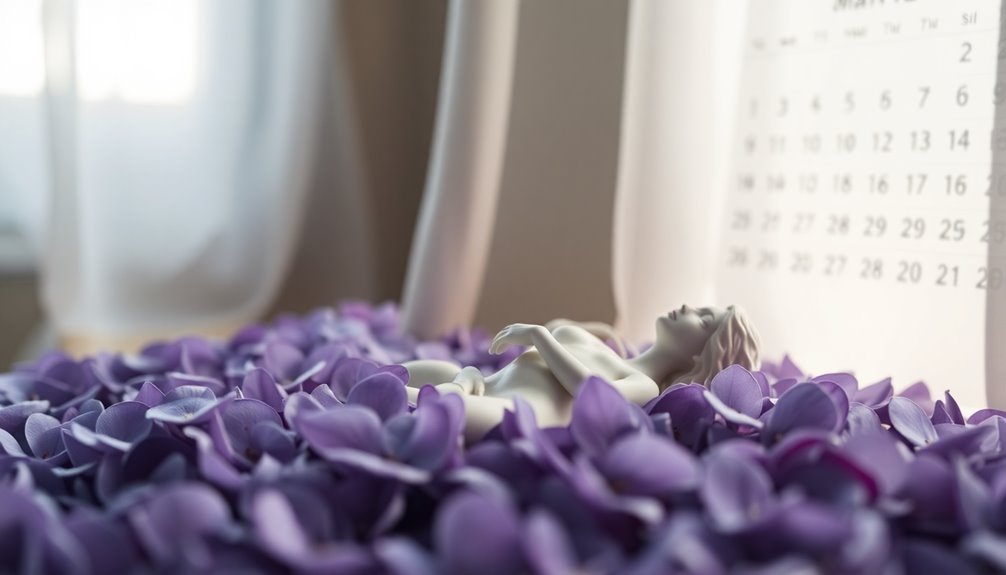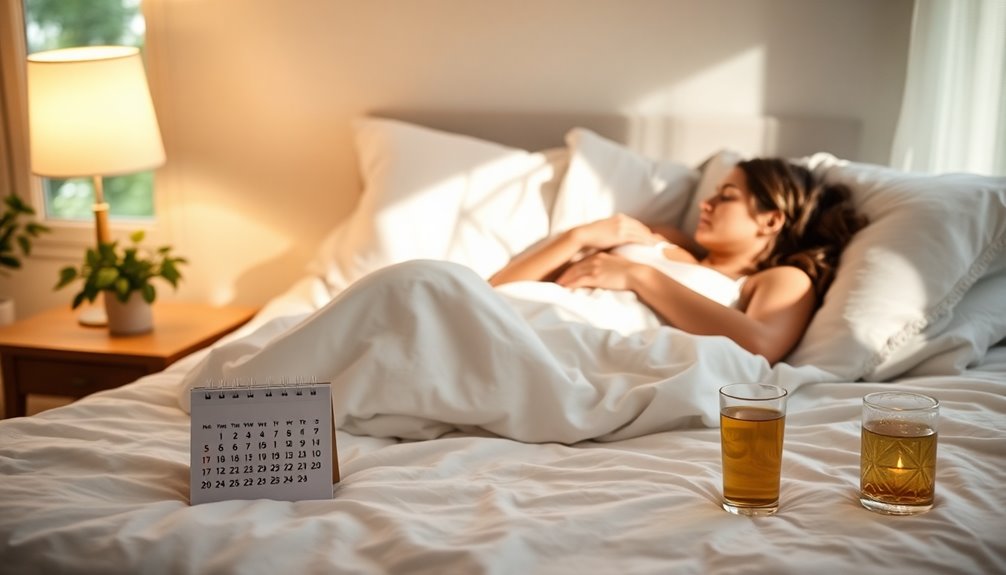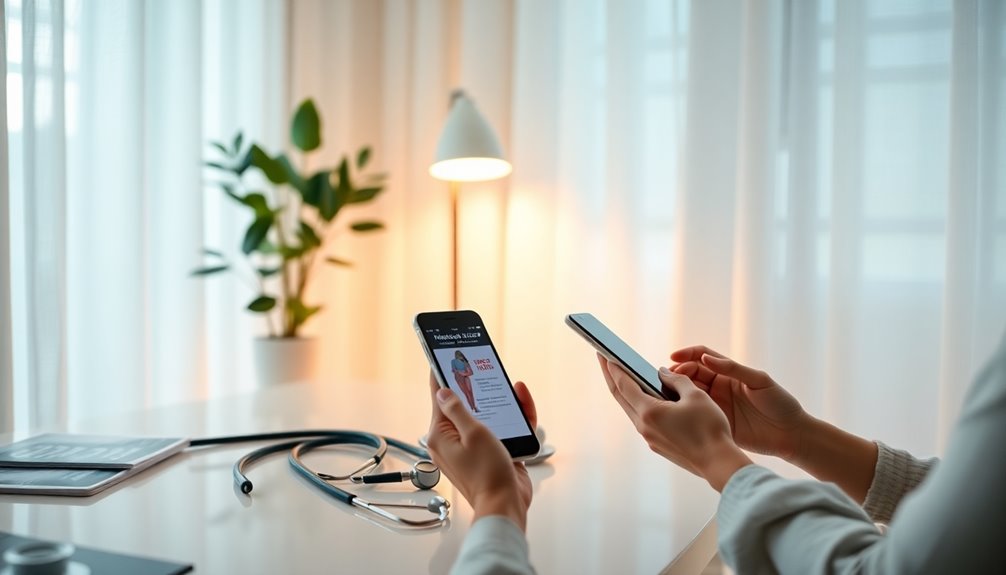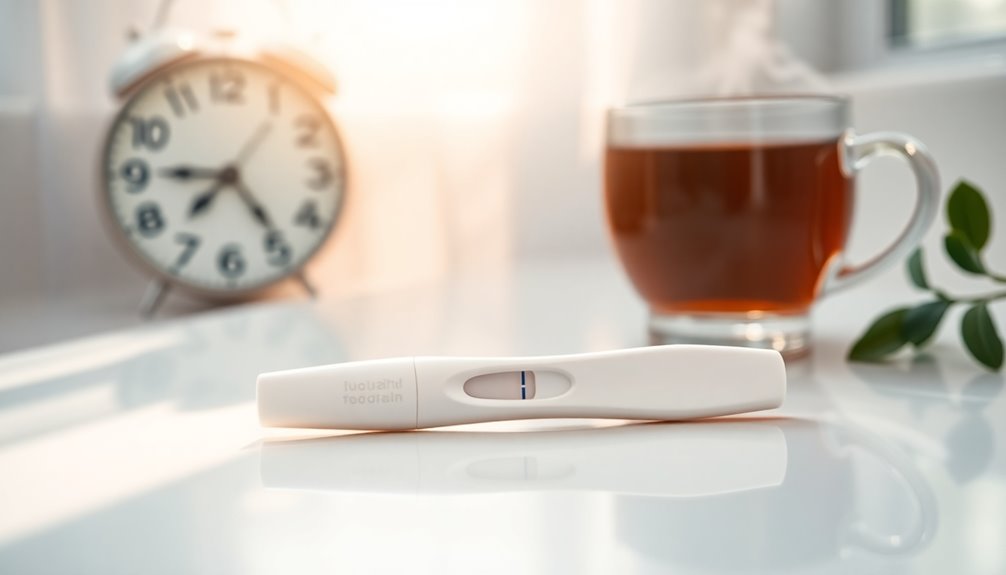Yes, sex can indeed induce your period. Engaging in sexual activity can stimulate hormonal changes and boost pelvic blood flow. When you orgasm, your body releases hormones like prostaglandins, which promote uterine contractions, potentially triggering menstruation. If you have sex close to your expected period, it might help bring it on. However, relying solely on sex for menstrual regulation isn't effective, as many other factors influence your cycle. Want to know what other methods can help manage your period and when to seek medical advice? There's more to explore on this topic!
Key Takeaways
- Sexual activity can increase pelvic blood flow, potentially influencing the onset of menstruation.
- Orgasm releases hormones that enhance uterine contractions, which may help trigger menstruation.
- Engaging in sex close to the expected period may induce menstruation for some individuals.
- Relying solely on sexual activity for regulating menstrual cycles is not effective or reliable.
- Other methods, like birth control or exercise, are more effective for inducing menstruation.
Understanding the Menstrual Cycle

Understanding your menstrual cycle is essential for recognizing how your body functions and what influences it. Typically around 28 days long, your cycle consists of four phases: menstrual, follicular, ovulation, and luteal.
Hormonal changes, primarily involving estrogen and progesterone, regulate these phases. Ovulation usually occurs around day 14, marking the release of a mature egg and playing a vital role in fertility.
The luteal phase follows, lasting about 14 days, and ends with menstruation if fertilization doesn't occur. Factors like stress, diet, and exercise can impact your cycle's regularity, potentially leading to irregular bleeding.
How Sex Affects Menstruation

While many factors influence your menstrual cycle, sexual activity can play a role in how and when your period arrives. Engaging in sex can increase blood flow to your pelvic area, which might impact the timing of your menstruation.
Additionally, the hormonal changes that occur during sexual arousal, like increased oxytocin and prostaglandins, can stimulate uterine contractions. These contractions may help facilitate the shedding of the uterine lining, potentially inducing menstruation.
Some studies suggest that having sex close to your expected period date can increase the likelihood of it arriving on time. However, it's important to understand your individual patterns, as relying solely on sex to regulate your cycle isn't effective.
Orgasm and Uterine Contractions

Orgasm plays a significant role in uterine contractions, which can influence the timing of your period. When you orgasm, your body releases hormones like oxytocin, enhancing pelvic blood flow and stimulating your uterus.
This activity can trigger uterine contractions that aid in shedding the uterine lining, potentially leading to the onset of menstruation. Additionally, prostaglandins released during orgasm may promote further contractions, reinforcing this effect.
Some studies suggest that engaging in sexual activity close to your expected period start date can correlate with an earlier onset of menstruation due to these contractions.
However, remember that individual responses vary, and relying on orgasm to consistently induce menstruation isn't recommended.
Hormonal Changes Induced by Sex

When you engage in sexual activity, your body releases hormones like oxytocin and endorphins, which can influence your menstrual cycle.
The increased blood flow to your pelvic region not only heightens sensitivity but may also help trigger your period if the timing is right.
This combination of hormonal shifts and physical responses can play a role in how your body manages menstruation.
Orgasm and Hormonal Release
During sexual activity, the release of hormones like oxytocin and prostaglandins can greatly influence your body.
When you experience an orgasm, these hormones kick in, potentially stimulating uterine contractions. These contractions can mimic the natural contractions of your uterus during menstruation, possibly helping to induce an earlier period.
Additionally, the hormonal release during sex can cause fluctuations in estrogen and progesterone levels, both of which are essential for regulating your menstrual cycle.
While anecdotal evidence hints that sex might induce menstruation, definitive scientific studies are still lacking.
However, the interplay of orgasm, hormonal release, and uterine contractions suggests that sexual activity could have an impact on your menstrual timing.
Blood Flow Increase
Increased blood flow to the pelvic region during sexual activity can greatly impact your menstrual cycle. This blood flow increase stimulates the uterus and may contribute to the onset of menstruation.
When you orgasm, uterine contractions occur, releasing prostaglandins that help shed the uterine lining. The hormonal changes that come with sexual arousal, like increased oxytocin levels, can also influence your cycle's timing.
Additionally, the higher blood flow may soften the cervix, potentially facilitating the onset of menstruation. Engaging in regular sexual activity can help maintain menstrual regularity by moderating hormonal fluctuations, though individual responses can vary widely.
Endorphins and Pain Relief
Sex can be a powerful ally in managing menstrual discomfort, as it triggers the release of endorphins, the body's natural painkillers. These endorphins can considerably alleviate menstrual cramps and discomfort associated with your period.
During orgasm, hormonal changes occur, producing oxytocin and prostaglandins, which stimulate uterine contractions and may help shed the uterine lining more effectively.
Additionally, the boost in endorphins promotes a sense of well-being, reducing stress and anxiety that can disrupt your hormonal balance. This reduction in stress can lead to more regular menstruation cycles.
Studies even suggest that increased pelvic blood flow and hormonal shifts during sexual arousal could enhance the likelihood of your menstrual onset, providing further relief from discomfort.
Timing of Sexual Activity

When you consider the timing of sexual activity, it's essential to pay attention to your menstrual cycle phases.
Engaging in sex during the luteal phase can enhance the chances of bringing on your period due to hormonal influences.
Understanding your unique cycle can help you determine the best times to potentially induce menstruation.
Menstrual Cycle Phases
Understanding the phases of your menstrual cycle can enhance your sexual experiences and help you time activities more effectively. The cycle consists of four phases that influence your body and sexual desire.
| Phase | Key Characteristics |
|---|---|
| Menstrual Phase | Shedding of uterine lining |
| Ovulation | Peak fertility, increased desire |
| Luteal Phase | Hormonal changes, potential for uterine contractions |
Engaging in sexual activity around ovulation, typically around day 14, can boost uterine contractions, possibly aiding in menstrual timing. Additionally, sexual activity during the luteal phase may facilitate the onset of menstruation if your body is preparing to shed the uterine lining. Understanding these phases can help you identify ideal times for sexual activity that correlate with your period.
Timing and Frequency
Timing your sexual activity can play a significant role in influencing your menstrual cycle. Engaging in sexual activity close to your expected period start date might help induce menstruation. This happens through the release of hormones like oxytocin and prostaglandins, which stimulate uterine contractions.
Maintaining regular sexual activity, ideally around once a week, can also contribute to a more predictable cycle by promoting hormonal balance in your body. The timing of intercourse relative to ovulation is essential, as hormonal changes leading up to your period can be more pronounced during this phase.
Orgasms may trigger uterine contractions, potentially facilitating the shedding of the uterine lining and leading to an earlier onset of menstruation for some women.
Hormonal Influence Factors
Engaging in sexual activity can greatly influence hormonal balance, which in turn affects your menstrual cycle.
When you have sex, especially during the luteal phase of your cycle, hormonal fluctuations can occur. Orgasm releases hormones like oxytocin and prostaglandins, which may stimulate uterine contractions, potentially leading to menstruation.
If you time your sexual activity close to your expected period, the physiological changes from arousal and orgasm might further increase your chances of inducing your menstrual cycle.
Understanding your cycle and tracking ovulation helps you optimize when to engage in sexual activity, enhancing the likelihood of experiencing your period.
Other Methods to Induce Menstruation

If you're looking to induce your period, several methods can help you achieve that goal. You might consider switching to placebo birth control pills or skipping them altogether to alter your hormonal signals. Herbal remedies like parsley tea, ginger, and yarrow can stimulate blood flow, but their effectiveness varies. Engaging in sexual activity can also induce menstruation through increased pelvic blood flow and uterine contractions. Reducing stress with yoga or meditation can positively affect your menstrual cycle, while regular moderate exercise helps maintain hormonal balance. However, excessive exercise can disrupt hormones and delay your period.
| Method | Description | Caution |
|---|---|---|
| Birth Control Pills | Alters hormonal signals | Consult a doctor first |
| Herbal Remedies | Stimulates blood flow | Efficacy varies by person |
| Exercise | Balances hormones and reduces stress | Avoid excessive exercise |
When to Seek Medical Advice

While exploring various methods to induce your period, it's important to recognize when to seek medical advice.
If you experience heavy or persistent bleeding after sex, or if it's accompanied by severe pain, don't hesitate to consult a healthcare provider. Frequent postcoital bleeding could indicate underlying issues that need evaluation.
Additionally, if you're concerned about your periods due to significant changes in your menstrual cycle, such as missed periods or irregular patterns, it's wise to get assessed for potential hormonal imbalances.
Unusual symptoms like fever or foul-smelling discharge accompanying bleeding should prompt immediate medical attention, as they may signal an infection.
Regular check-ups are essential for monitoring reproductive health and ensuring your well-being.
Common Concerns About Bleeding

Bleeding after sex can raise various concerns, especially if it occurs unexpectedly.
It's important to understand potential causes of postcoital bleeding. Here are some common factors to take into account:
- Cervical Irritation: Physical stimulation can irritate the cervix, causing bleeding.
- Vaginal Dryness: Insufficient lubrication may lead to minor trauma and spotting or light bleeding.
- Hormonal Fluctuations: Changes in your menstrual cycle can result in unexpected bleeding, particularly around ovulation.
- Underlying Conditions: Bright red, profuse bleeding might signal issues like cervical dysplasia or STIs, necessitating medical advice.
If you notice any unusual patterns in your bleeding after sex, consult a healthcare professional to guarantee your well-being.
Regular monitoring is key.
Factors Influencing Menstrual Irregularities

Menstrual irregularities can stem from a variety of factors that directly impact hormonal balance.
Stress is very important in this regard, as it affects the hypothalamus, the part of your brain that regulates hormones tied to your menstrual cycle. When you're stressed, it can cause irregular cycles or missed periods.
Additionally, significant weight changes—whether gain or loss—can also disrupt your hormonal equilibrium, leading to lower estrogen levels.
Excessive exercise can further exacerbate the situation, potentially resulting in amenorrhea.
Age-related hormonal shifts during perimenopause can introduce irregular cycles and spotting.
Finally, certain medications, especially hormonal contraceptives, may alter your bleeding patterns, contributing to menstrual irregularities.
Understanding these factors can help you manage your menstrual health better.
Frequently Asked Questions
Can Having Sex Make You Start Your Period?
Having sex can potentially influence when your period starts.
During orgasm, your body experiences uterine contractions, which might help the uterine lining shed. The release of hormones like oxytocin can also play a role in your menstrual cycle.
You might notice that engaging in sexual activity close to your expected period date can sometimes lead to an earlier onset, but it's not a guaranteed method and results can vary from person to person.
Does Sex Induce or Delay Periods?
Sex generally doesn't delay your period; in fact, it might influence its timing.
When you engage in sexual activity, particularly achieving orgasm, you can stimulate uterine contractions that could help bring on menstruation. While some people report this effect, the scientific evidence is limited.
Understanding your own cycle and how sexual activity aligns with it can help you better gauge any potential impact on your menstrual timing.
Why Did I Get My Period After Sex?
You might've noticed your period starting right after sex due to several factors.
Engaging in sexual activity can cause uterine contractions, which might help trigger menstruation. Additionally, hormonal changes during sex, like the release of oxytocin and prostaglandins, can influence your cycle.
Stress relief and relaxation from intimacy could also contribute to a more regular cycle.
What Can Cause Your Period to Come Early?
Imagine your body as a finely tuned orchestra, where various factors can shift the tempo of your menstrual cycle.
Stress, hormonal changes, and lifestyle adjustments can all cause your period to arrive early. For instance, if you've recently upped your exercise routine or altered your diet, those changes might influence your hormones.
Natural remedies and even sexual activity can play roles in this rhythm, nudging your cycle to start sooner than expected.
Conclusion
To summarize, while some folks believe that intimacy can nudge nature along and bring on their monthly visitor, the truth is a bit more nuanced. Engaging in romantic activities might stir things up, but it's not a guaranteed ticket to your cycle. If you're feeling out of sync or have concerns, it's wise to chat with a healthcare professional. Remember, every body's rhythm is unique, so embrace the journey and listen to what your body's telling you!










